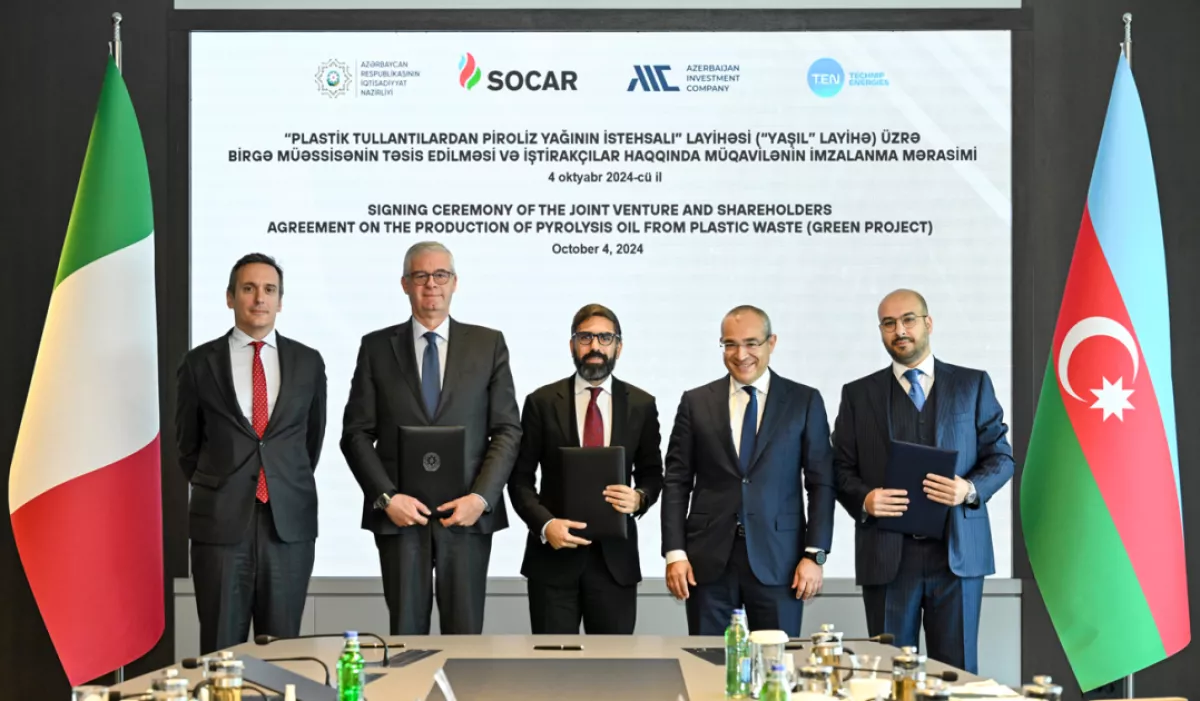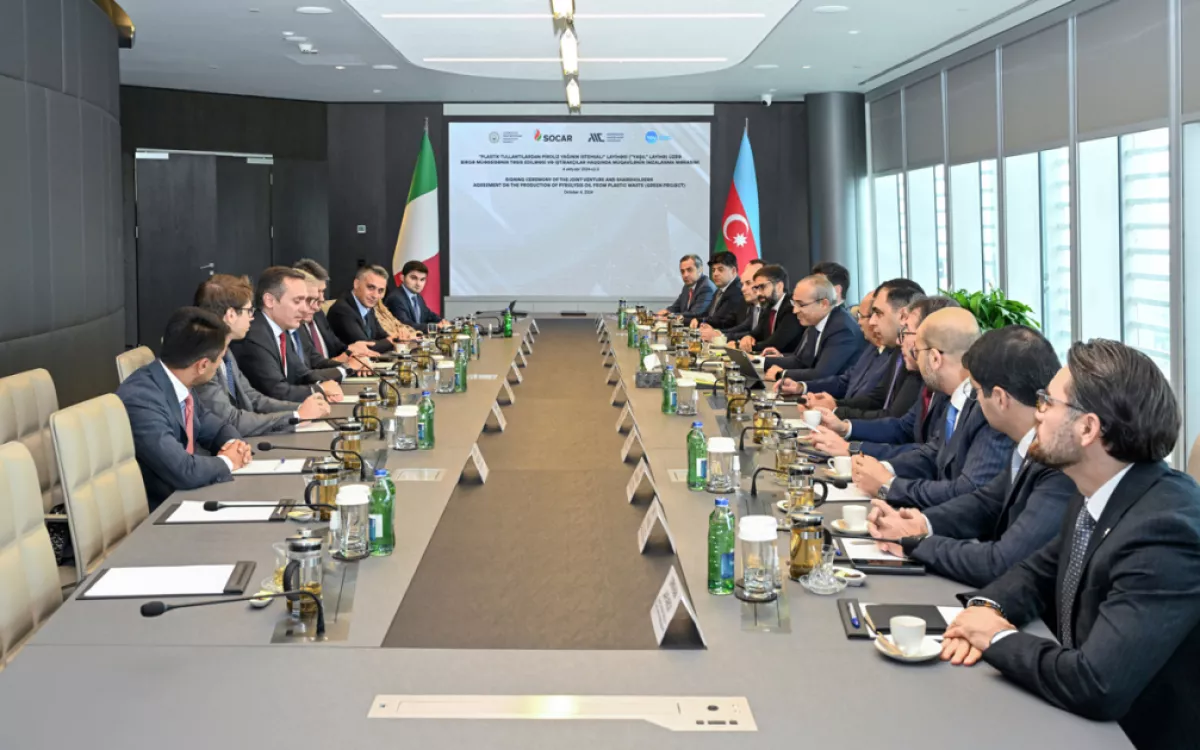From waste to wealth: Baku and Rome join forces A game-changer in plastic waste recycling
Azerbaijan's industrial landscape has long been defined by its robust chemical and oil refining sectors, which boast significant export potential. Key players in this field include the polymer, urea, and methanol plants operated by the State Oil Company of Azerbaijan Republic (SOCAR). The petrochemical sector is also making strides in the Sumgayit Chemical Industrial Park (SCIP), a leading industrial cluster in the country.
Recently, a significant development emerged with the announcement of a new capital-intensive project: the establishment of a plant dedicated to producing pyrolysis oil from plastic waste. This initiative is a collaborative effort between the Azerbaijan Investment Company OJSC (AIC), SOCAR's subsidiary SOCAR Downstream Management LLC, and the Italian TechnipEnergies S.p.A. A joint venture agreement was signed to advance this promising project, signaling a proactive approach to tackling plastic waste while enhancing Azerbaijan's industrial capabilities and export potential.
One of the key objectives of the “Azerbaijan 2030: National Priorities for Socio-economic Development," established several years ago, is to facilitate a qualitative transformation of the national economy. This transformation aims to enhance the competitiveness of the non-oil sector and strengthen its presence in international markets.
To achieve the goals outlined in this strategy, Azerbaijan is targeting a significant increase in non-oil exports, aiming to reach $5.3 billion by 2027. A vital component of this plan involves expanding production within the petrochemical industry and establishing new chemical enterprises. These new facilities will focus on adopting “green” and waste-free technologies, aligning economic growth with sustainable practices.
A prime example of successful initiatives in Azerbaijan's petrochemical sector is the State Oil Company's (SOCAR) major enterprises. SOCAR Carbamide produces nitrogen fertilizers and their raw materials, while SOCAR Polymer, a leading manufacturer of polymer products, began operations in early 2019. Additionally, the SOCAR Methanol plant produces methanol with an impressive 99.9 per cent purity. Notably, the majority of the production capacity from all three facilities is dedicated to export.
Furthermore, SOCAR’s operations extend to Türkiye, where the Petkim Complex and STAR Refinery—both owned by SOCAR—play a crucial role. These facilities ensure a steady supply of chemical raw materials from Azerbaijani enterprises to Türkiye, creating a significant market for Azerbaijan's domestic chemical industry.
In addition to polymer raw materials, nitrogen fertilizers, and methanol, Azerbaijan has also successfully exported diesel fuel, aviation kerosene, pyrolysis resin, and petroleum coke to markets in the EU, China, Türkiye, and former Soviet states. Statistics for January to August 2024 highlight the effectiveness of the country’s leading chemical industry enterprises. For instance, Azerbaijan exported 418.3 thousand tons of urea fertilizers during this period, marking a remarkable increase of 71.4 per cent compared to the same period last year. Additionally, methanol exports reached 342.6 thousand tons, reflecting a growth of 12.7 per cent.
In parallel with the modernization and construction of new foundational enterprises within the Azerkimya petrochemical complex, Azerbaijan is also establishing new facilities focused on the production of final chemical products. These second-tier enterprises are primarily located in the Sumgayit Chemical Industrial Park (SCIP). Here, a diverse range of products is being developed from polymer and other petrochemical raw materials, including chemicals for agricultural, household, automotive, medical, and construction uses.
Established in 2011, Sumgayit Chemical Industrial Park is the largest industrial park in Azerbaijan, and it has registered nearly forty resident companies, attracting approximately AZN 6 billion in investments. Currently, around seven thousand people are employed in the park. Over its operational history, SCIP has generated sales totaling AZN 10 billion, with more than a third of that amount derived from exports.

A significant new chemical plant is set to be constructed in the Sumgayit Chemical Industrial Park. Azerbaijani Economy Minister Mikayil Jabbarov announced on his social media account that the Azerbaijan Investment Company (AIC), operating under the Ministry of Economy, has entered into a joint agreement with SOCAR Downstream Management LLC and the Italian TechnipEnergies S.p.A. to implement a project for producing pyrolysis oil from plastic waste.
This “green” initiative, with a total investment of €97 million, aims to enhance waste recycling, improve industrial production processes, and reduce carbon emissions.
Under the agreement for establishing the joint venture (JV), AIC will hold a 30 per cent stake in the project, while SOCAR Downstream Management and TechnipEnergies will share the remaining 70 per cent equally.
During discussions between Economy Minister Mikayil Jabbarov, SOCAR President Rovshan Najaf, and Chief Business Officer of Technip Energies Marco Villa, the participants highlighted the significance of leveraging international best practices and modern technologies to tap into Azerbaijan's potential in the green industry. They explored the transition to low-carbon business solutions and identified new avenues for collaboration.
One key project discussed was the "Production of Pyrolysis Oil from Plastic Waste." It was revealed that the new joint plant, to be located within the Technopark of the agricultural sector, is expected to produce 23,000 tons of pyrolysis oil annually by processing approximately 36,000 tons of recyclable plastic materials. According to the Ministry of Economy, this innovative approach will involve recycling plastic waste through high-temperature decomposition, thereby reducing the carbon footprint by lowering emissions and generating alternative fuel.

The establishment of plastic waste recycling facilities is poised to yield significant environmental benefits by reducing the accumulation of hazardous municipal solid waste in Azerbaijan. Moreover, these facilities will open promising avenues for exporting valuable raw materials.
In 2023, the global pyrolysis oil market was valued at approximately $340 million and is projected to surpass $452 million by 2030, indicating robust future growth. Pyrolysis oil possesses a fuel value that ranges from 50 per cent to 70 per cent of traditional petroleum-based fuels. Key markets for this product include Europe, China, and the Asia-Pacific region.
Pyrolysis oil is versatile and can be utilized to replace furnace fuel oil in steam boilers and thermal power plants, serve as a raw material in the transportation sector, and function as fuel in the production processes of industries such as steel, glass, and cement.
TechnipEnergies brings 60 years of experience and a workforce of over 15,000 employees, operating in 34 countries within sectors such as sustainable fuels, chemistry, waste management, gas, and low-carbon energy. This Italian partner has established strong and productive relationships with Azerbaijan in the oil and petrochemical industries.
Since 2004, TechnipEnergies has played a significant role in various projects within Azerbaijan's upstream and downstream sectors. Their contributions include involvement in the Shah Daniz gas projects, as well as modernization efforts at the Azerkimya petrochemical complex and the Heydar Aliyev Oil Refinery.
A promising avenue of collaboration with the Italian partner involves the conceptual design of offshore wind turbines for power generation, aimed at replacing gas turbines currently installed on oil platforms. In 2021, SOCAR and TechnipEnergies signed a cooperation agreement to study sustainability measures in the offshore upstream activities, which outlines plans for a pilot project to construct an offshore floating wind farm.








